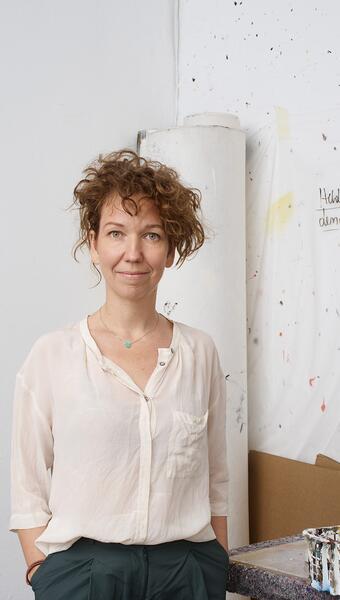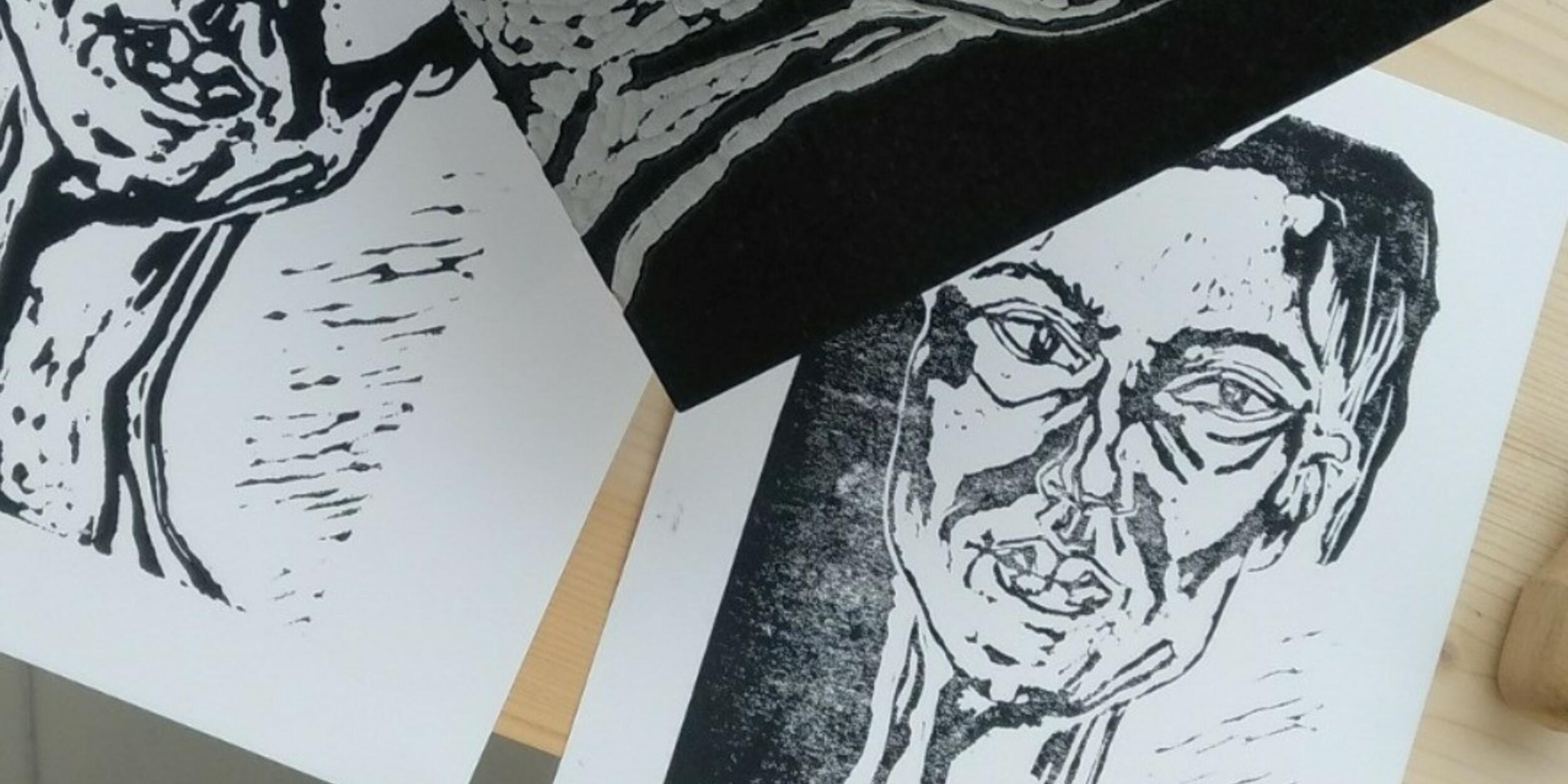
Univ.-Prof. for Graphic Arts & Painting / Visual Education / Representative for the study of Art and Craft Education in Innsbruck

The teacher training program in the subject of Art Education explores the field of tension between the production, reception, and communication of the arts, images, and media. To what extent is production always also a transmission of knowledge? Why are creating and viewing inseparable? The goal of the program is the development of an artistic-practical, researching and mediating approach to the arts, images and media.
Study & Examination Management
+43 676 88122 492
studienabteilung@moz.ac.at
Length of study
8 semesters / 240 ECTS credits
Language
German
Registration deadline & portfolio submission
Application period: 5.2.-4.6.2024
- APPLY NOW!
Portfolio submission: until 4 June 2024
Practical examination: 1 July 2024
Individual interviews: 2-4 July 2024
Admission examinations
to the dates
Downloads
It is precisely the practice of the arts that is able to make social transformation processes, such as those in the age of digitality, visible and critically reflectable, because they often pick up on changes faster than other areas of society, process them aesthetically and thus make them accessible.
In order to sharpen and implement this differentiated, sensory-reflective perception in education, [visual arts] education goes far beyond the learning of techniques, material skills and digital applications. The focus on the artistic-experimental process leads to a deeper understanding of the visual arts based on individual practice. This is accompanied by critical analysis, questioning and positioning of one's own work in dialogue with the reference systems of historical and current discourses as well as socially relevant topics. As a constructive interface between artistic and pedagogical action, art production and exhibition practice are expanded through strategies of interaction, participation and mediation.
In [visual] education - in the sense of pedagogical engagement with the visual arts and visual culture - we are dealing with diverse forms of knowledge. Considering such forms in their diversity from an artistic and pedagogical perspective requires an open mind and a constant questioning of traditional positions. Especially in the age of digitality and cultural diversity, completely new pedagogical and artistic challenges arise. For us, this raises the question of what the next art education might look like.
The answer can only be a search movement that takes on the social, cultural, political, technical and geographical changes both artistically and theoretically and attempts to fundamentally rethink education.
The teacher training programme for secondary education (general education) consists of a Bachelor's and a Master's programme and trains students to become teachers in the chosen teaching subjects.
The planned duration of the Bachelor's degree programme in Secondary Education (General Education) is 8 semesters. In principle, two teaching subjects must be chosen, which are supplemented by general educational science basics, free electives and integrated pedagogical-practical studies. The subject of Artistic Education can be combined with any other subject.
The bachelor's degree programme in Artistic Education provides basic training in subject-related sciences and subject didactics, pedagogical sciences, educational sciences and practical school experience as pre-service training for the teaching profession at middle and secondary schools.
In addition to the teaching profession, graduates also have access to professions outside of school: in the field of fine arts, art education, conceptual work in art and cultural institutions, independent child and youth work, art and cultural studies, scientific as well as artistic-scientific research or in the context of adult education.
Specialisation in aesthetic and cultural education is promising not only in the education sector, in the university sector or in the field of social work, but also in the economy, as it opens up many interfaces to other areas. Artistic approaches or creative problem-solving processes certainly play a role in the development of new commercial products and applications.
Depending on the subject with which the BE is combined, a stronger accentuation of artistic-practical, scientific-research or mediating interests can already be consciously made during the course of study.
The teacher training programme at secondary level (general education) is carried out in cooperation with the following partner institutions (Entwicklungsverbund Cluster West):
Artistic education is studied as an artistic teacher training program in combination with a freely selectable second teaching subject. In addition, the study program is framed by educational science and pedagogical-practical training.
The subject-specific part of the study program is divided into three major areas, which are interlinked by the common interest in the artistic-research approach to the production, reception and mediation of art, images and media: Subject Didactics, Subject Science, and Art Practice.
Subject didactics comprises lectures, exercises, proseminars and seminars. These address the understanding of the subject of art education, its historical development, the institutional framework and guidelines. They provide reflection impulses for the activity as a teacher of art education and suggestions for the development of different approaches and methods for teaching the contents.
With its lectures, exercises, proseminars and seminars, the subject area offers well-founded insights into the central contents of BE: history of art and architecture, art and image theory, history of media and everyday life, environmental design and cultural studies.
Art practice focuses on practical artistic engagement. In four classes: Painting, Drawing and Printmaking, Sculpture, and Photography/New Media, students can explore a wide range of expressions and attitudes toward art production. The permeability of the classes makes it possible not only to perfect individual approaches, but to benefit from a multimodal way of engagement.
In order to be admitted to the Bachelor's programme, various certificates and examinations are required:
The subject Design: Technology.Textiles must be combined with a second subject. The combination with the teaching subject Fine Arts Education at the Mozarteum University is possible and requires proof of artistic achievements in a separate admission examination.
The General Admission Procedure for all teacher training programmes consists of several steps:
Please check the cluster website for exact dates and procedures.
Registration for the artistic entrance examination is done via the registration portal for applicants.
Link to the registration deadlines
Link to the examination dates
Registration may only be made for one development association, Central (Salzburg) or Western (Innsbruck). Double registration at both locations is not permitted and will be cancelled.
Necessary documents for online registration
Form of the documents
Artistic entrance examination
The artistic entrance examination consists of a practical examination and an oral examination.
Practical examination on 1.7.2024 from 8:30 a.m., all-day work possibility:
Examination interview:
The Study and Examination Management will inform you about the result of the entrance examination by e-mail within four weeks after the entrance examination. Should applicants not be able to take part in the admission test for artistic aptitude, they must deregister in good time.
Selected works of your previous artistic activity make your interests, abilities and potential visible. Diversity in thematic and technical terms is desired.
Please note:
The application portfolio must be submitted by the application deadline (4.6.2024)!
Link to data protection information (German)
Preparatory discussions (portfolio advice, etc.) can be individually agreed and handled by video conference. Contact us, we will be happy to advise you!
Here you can find more information about starting your studies: